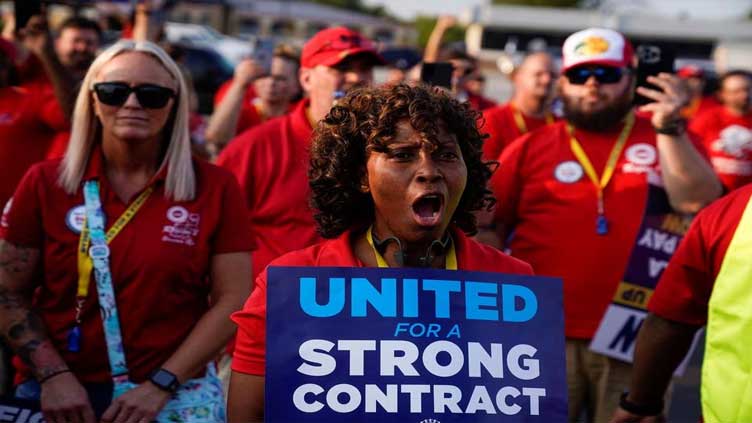UAW to strike more GM, Stellantis plants

Technology
UAW to strike more GM, Stellantis plants
DETROIT (Reuters) - The United Auto Workers will expand its strikes against Detroit automakers General Motors (GM.N) and Chrysler parent Stellantis (STLAM.MI), but has made real progress in talks with Ford Motor (F.N), the union said on Friday.
The autoworkers' union will expand its strike against parts distribution centers across the United States at GM and Stellantis, extending its unprecedented, simultaneous strikes that began with one assembly plant each of the Detroit Three.
UAW President Shawn Fain, in a Facebook live event, said by targeting distribution centers, this turns the strike into a nationwide event.
"We will be everywhere from California to Massachusetts, from Oregon to Florida," said Fain.
Fain said earlier this week further strikes could be avoided if companies showed "significant progress" toward an agreement.
"Stellantis and GM in particular are going to need some serious pushing," said Fain. He said they have more work to do at Ford, but "we do want to recognize that Ford is showing they're serious about reaching a deal."
The union will also invite President Joe Biden to come to the picket lines. The president has been vocal in his support for the union's demands for better pay and benefits.
Ford shares gained 3.7% while GM shares were up 0.8%, the latter paring earlier gains following the news. GM did not immediately comment. Stellantis said the company is continuing to meet with the union.
Ford said it is continuing to negotiate, adding that "we have more work ahead of us before we can reach an agreement."
The wider strike will not at this time include plants that build highly profitable pickup trucks like GM's Chevy Silverado and Stellantis' Ram.
About 12,700 workers walked out at plants in Missouri, Michigan and Ohio on September 15. Those plants produce the Ford Bronco, Jeep Wrangler and Chevrolet Colorado, alongside other popular models.
Responding to the news of progress at Ford, Arthur Wheaton, who teaches collective bargaining at Cornell's School of Industrial and Labor Relations, said "I'm not surprised and that is primarily because Ford has a long history of stronger labor relations."
PROLONGED ACTION
The standoff is fueling worries about prolonged industrial action that could disrupt production and ripple through the supply chain and dent U.S. economic growth. A Reuters/Ipsos poll released on Thursday shows significant support by Americans for the striking auto workers.
The strike has become a focus of attention for Biden and Republican candidates who want to replace him. An invitation by the UAW to Biden would be a notable overture by the union to the White House, which it has held at arm's length until now.
White House spokeswoman Karine Jean-Pierre was asked Thursday if Biden plans to visit a picket line. She declined to answer but said "All parties continuing to be at the negotiating table is a positive. It is important that we result in a win-win agreement."
The White House did not immediately comment on Friday.
Fain has said the Detroit automakers have not shared their huge profits with workers while enriching executives and investors.
GM President Mark Reuss this week rejected those claims, saying the current offer to the union would be generous and the company's profits have been reinvested in the transition to electric vehicles.
The automakers have proposed 20% raises over 4-1/2 years, while the UAW is seeking 40%.
The union also wants to end a tiered wage structure that it says has created a large gap between newer and older employees.
S&P said the strikes, which began on Sept. 15, were highly likely to last several weeks, potentially cutting third-quarter U.S. gross domestic product by 0.4% and causing "upheaval" across global automotive supply chains.
GM, Ford and Stellantis have said they are making contingency plans for further U.S. work stoppages.
Ford reached a last-minute deal to avoid a walkout at its Canadian operations late on Tuesday. Unifor, which represents about 5,600 Canadian auto workers, had been threatening to go on strike at all three Ford plants in the country.

